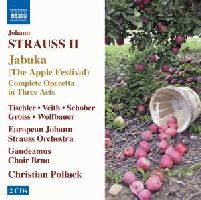 |
|
Naxos BSIN02873875 (2 CD-Set) Pollack / Tischler / Veith / Folle - Jabuka (Das Apfelfest) (2 CD-Set) Composer: Johann Strauss Sohn Johann Strauss Sohn (1825-1899) - Jabuka (Das Apfelfest / The Apple Festival) (Operetta In Three Acts)
Libretto by Max Kalbeck and Gustav Davis
An operetta with musical elements of true opera, Jabuka (Das Apfelfest), is Johann Strauss the Younger’s fourteenth stage work. An annual Apple Festival in the Serbian town of Ravica is an opportunity for local young people to choose a partner. The girl bites an apple, gives it to her chosen boy, and if he also takes a bite, the match is made. It is against this backdrop that the impoverished noblemen, Mirko and Vasil, find a way out of their difficulties by finding rich brides at the Apple Festival of the title. With its strikingly fresh and original melodies, great ensembles and some of the finest choruses Strauss ever wrote, Jabuka was a huge success at its première in Vienna in October 1894.
Personnel:
Mirko von Gradinaz – Thomas Tischler (tenor)
Vasil von Gradinaz – Wolfgang Veith (tenor)
Mischa, a rich peasant – Michael Schober (bass)
Jelka, his daughter – Veronika Groiss (soprano)
Petrija, her aunt – Elisabeth Wolfbauer (mezzo-soprano)
Bambora, a factory owner – Helmut Josef Ettl (baritone)
Annita, his daughter – Elisabeth Wolfbauer (mezzo-soprano)
Joschko, a court servant – Franz Födinger (tenor)
Franjo, a policeman – Alexander Eschig (baritone)
Staklo / Sava – Max Sahliger (bass)
Gaudeamus Choir Brno (Chorus-master: Štepán Policer)
European Johann Strauss Orchestra (Concert-master: Jirí Preisinger)
Christian Pollack (Conductor and music director)
About this Recording
Jabuka is Johann Strauss's fourteenth stage work. Its première took place on 12 October 1894, during a very special week when Vienna was celebrating the fiftieth anniversary of Strauss's artistic début.
The première, starring the great Alexander Girardi, was a crowning jewel of the celebration and a triumph for Strauss. Despite the initial success and enthusiasm, however, the weaknesses of the libretto were obvious. It is believed that Strauss became interested in the Slavic theme of Jabuka after hearing the successful staging of Smetana's The Bartered Bride in Vienna in 1892 during the International Exposition of Music. Jabuka had two librettists, Max Kalbeck who wrote the plot, while Gustav Davis wrote lyrics to songs.
Max Kalbeck was a respected journalist and was the translator of The Bartered Bride into German for its Viennese première. Jabuka, however, represented his début in writing for the stage.
Gustav Davis, on the other hand, was an experienced librettist. The two librettists soon came into conflict. Max Kalbeck tried to steer Johann Strauss towards an opera, while Gustav Davis was attempting to keep Strauss to a classical operetta. Eventually, the librettists stopped cooperating and Strauss was caught between them. The result is on the one hand a weak libretto, but on the musical side, a very interesting work, part opera, part operetta.
Professor Christian Pollack considers Jabuka an excellent work. In his words, if one takes the couplets away, it is a full-scale opera with great ensembles and the finest choruses Strauss ever wrote, and as far as the couplets are concerned, Girardi must have had a feast as they are simply irresistible. Thus Max Kalbeck missed out on his one and only opportunity to write for the theatre. Characteristically for Strauss, the problems with the libretto made absolutely no impact on his excellent relationship with Kalbeck, and the two remained good friends even after Jabuka.
In 2003 the Czech Johann Strauss Society decided to stage a rare Strauss operetta as part of the European Johann Strauss Stage Works Festival. This formed part of an idea by Dr Eduard Strauss of Vienna to stage all Strauss's works for the musical theatre. Very soon Jabuka became an obvious choice for its irresistible musicality and Slavic flavour.
Professor Christian Pollack used the original Strauss score for this recording, which was provided by Professor Norbert Nischkauer of Vienna. Concert Master and violin soloist Jirí Preisinger organized and led the orchestra.
The Czech Johann Strauss Society wishes to thank all three for their great support. The soloists are all from Austria, the chorus and orchestra from Brno.
Released 2007.
Price:
13,90 EUR

|
|